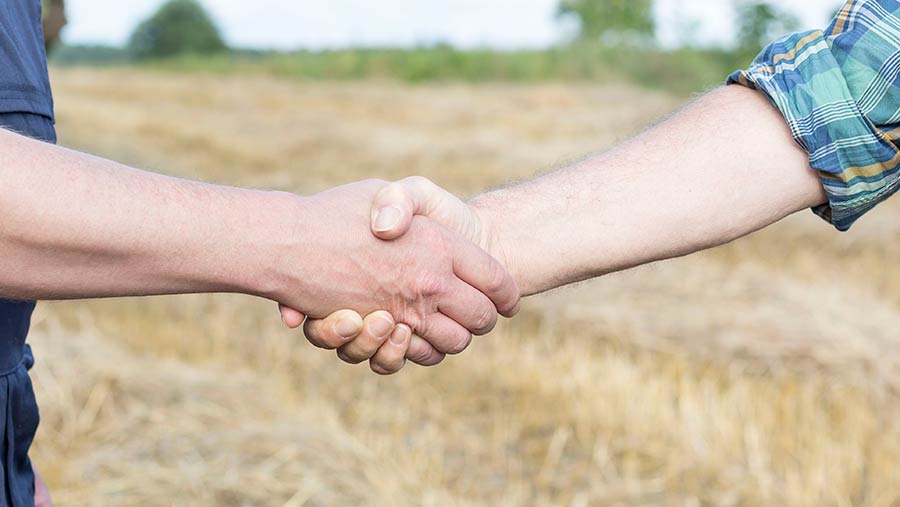Business Clinic: Is my son a partner in the farm business?
 © WestEnd61/REX/Shutterstock
© WestEnd61/REX/Shutterstock Whether you have a legal, tax, insurance, management or land issue, Farmers Weekly’s Business Clinic experts can help.
Here, Mike Westbrook of Thrings advises on a tricky family situation involving a farming partnership.
Q I have a farm that is in trust, which I rent with my two sons. My eldest son runs his own separate business and has done so for 20 years.
He has no contact with the farm. My youngest son runs the farm with me. The problem is that the two sons don’t get on at all and my youngest son would like to run the farm on his own, but his brother still insists he is a partner (although there has never been anything in writing) and that he is entitled to see the accounts, for example.
Please advise on the best way forward so my son who does the farming can do so without hassle from his brother.
A The best way for the writer’s elder son to be able to manage the farming partnership independently from his brother is to determine (if it is right to do so) that the elder brother is not a partner.
 Mike Westbrook
Mike Westbrook Partner, Thrings
It seems there is likely to be a partnership between the writer and his younger son.
However, do the arrangements on the farm, as a matter of law, constitute a partnership of the farming business between the writer and both sons?
See also: Business Clinic – can I sell stored caravan to cover unpaid storage fees?
The most straightforward way of identifying the nature of partnership arrangements is by reference to a written partnership agreement.
However, as there is not one here, it would be necessary to rely on the rules for establishing whether a partnership exists as set out in the Partnership Act 1890, as well as various legal cases on the point.
Under the Act, a partnership can arise without any documentation when two or more people “carry on a business in common with a view of profit”.
It is necessary to look at the arrangements themselves and all of the relevant background and history, which determine the existence and nature of the partnership, rather than the intentions of the individuals.
There is not sufficient evidence in the question to reach a conclusion, but several points and queries would need to be addressed:
- Is the elder brother currently included in the farming partnership accounts and does he share in the profit from the farming business? If not, it is evidence that he is not a partner in the farming business. It would also be difficult for him to argue that he has become a partner without any involvement in the business.
- Has the elder brother been part of the farming partnership at any point? If so, what was he entitled to as a partner in terms of sharing of profits and partnership capital? Has he had any payments from the partnership in lieu of that which would indicate his retirement/removal?
- The two businesses (the farming business and elder brother’s business) appear to be run entirely separately and the elder brother has no day-to-day involvement in running the farm. That is a good indicator that, even if he once was a partner in the farming business, he no longer is one.
- Are separate accounts prepared for the farming business and the elder brother’s business?
- Does the farming business have a separate bank account from the elder brother’s business?
- Is the elder brother on the mandate of the farm business account?
- The writer explains that the farm is rented to the writer and his two sons, but that the businesses are carried on separately. Does the elder brother conduct his business from the farm premises? If not, it would be a further indication that the businesses are separate from one another.
- If the elder brother’s business is run from the farm, does he pay rent for the part of the farm he occupies separately from any rent paid by the farming business?
No one of these factors and questions will determine whether the elder brother is a partner in the farming business. Rather, as mentioned above, it will be necessary to look at the arrangements in the round.
Even if the writer and his younger son are able, on the basis of sound legal advice, to say with confidence to the elder brother that he is not a partner in the farming business, there remains the issue as to whether that alone will be sufficient to convince him to leave his younger brother alone to run the farm.
If the elder brother continues to dispute that he is not part of the farming partnership and continues to cause issues, ultimately the matter would need to be decided by the court, although that would be costly and time-consuming.
A further issue to consider is whether the elder brother has a tenancy of the farm land, together with the writer and his younger brother, and what form that takes. Unfortunately there is not enough information to give any meaningful advice at this stage.
If there is one, it may be possible to bring the tenancy to an end, but this would need careful consideration alongside the partnership advice, particularly if the tenancy is an asset of the partnership.
This is a complex situation and both the law and procedure heavily depend on your specific facts. It is therefore recommended that you seek specialist independent legal advice to assess your situation.
Do you have a question for the panel?
 Outline your legal, tax, finance, insurance or farm management question in no more than 350 words and Farmers Weekly will put it to a member of the panel. Please give as much information as possible.
Outline your legal, tax, finance, insurance or farm management question in no more than 350 words and Farmers Weekly will put it to a member of the panel. Please give as much information as possible.
Send your enquiry to Business Clinic, Farmers Weekly, RBI, Quadrant House, The Quadrant, Sutton, Surrey SM2 5AS.
You can also email your question to fwbusinessclinic@rbi.co.uk.
